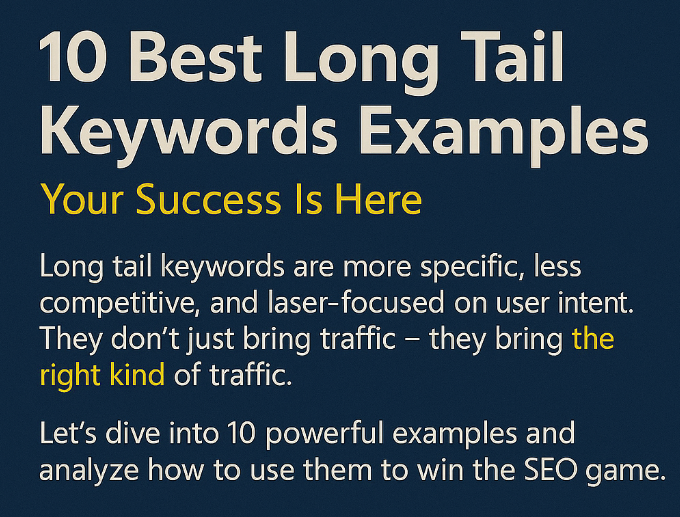Long tail keywords are more specific, less competitive, and laser-focused on user intent. They don’t just bring traffic — they bring the right kind of traffic.
Let’s dive into 10 powerful examples and analyze how to use them to win the SEO game.
✅ What Are Long Tail Keywords?
Long tail keywords are 3 or more words that describe highly specific search queries.
They often reflect what a user is really looking for, and they typically have:
Lower competition
Higher conversion rates
Clearer user intent
🔟 10 Best Long Tail Keyword Examples (With Analysis)
1. “Best running shoes for flat feet women”
🎯 Intent: Buyer is ready to purchase a specific product.
📈 Tip: Create a review, comparison, or buying guide page.
2. “How to start a small bakery business from home”
🎯 Intent: Informational + commercial. Early funnel.
📈 Tip: Use blog content + free downloadable checklist.
3. “Affordable wedding photographer in Santorini”
🎯 Intent: High-converting local query.
📈 Tip: Optimize service page + Google Business profile + portfolio.
4. “Best laptop for video editing under $1000”
🎯 Intent: Product-focused with budget filter.
📈 Tip: Use comparison tables and affiliate links.
5. “Gluten-free cake recipe without eggs”
🎯 Intent: Very specific dietary need.
📈 Tip: Add SEO schema (recipe) + nutritional facts.
6. “Digital marketing course with certification online”
🎯 Intent: Mid-to-bottom funnel; user is researching education.
📈 Tip: Use landing page with course benefits, reviews, and CTA.
7. “What to pack for a 10-day Europe trip in summer”
🎯 Intent: Informational; high engagement potential.
📈 Tip: Listicle format + packing checklist download.
8. “How to meditate for beginners at home”
🎯 Intent: Educational with high search volume.
📈 Tip: Use step-by-step guide and video walkthroughs.
9. “Cheap flight deals from NYC to Paris in March”
🎯 Intent: Transactional. Ready to convert.
📈 Tip: Real-time pricing updates + trust signals.
10. “Pet-friendly hotels in Athens city center”
🎯 Intent: Commercial local query.
📈 Tip: Use booking filters, pet policy info, and user reviews.
🛠️ How to Find Long Tail Keywords
Google Auto-suggest & People Also Ask
Answer the Public
Ubersuggest / Ahrefs / SEMrush
Reddit & Quora questions
Your own search console data
📌 SEO Benefits of Long Tail Keywords
Higher conversion rates
Lower bounce rates
Better ranking opportunities
More specific targeting
They may bring less traffic individually, but combined, they create massive potential.
❓ Frequently Asked Questions
🔹 Q1: How many words is a long tail keyword?
A long tail keyword usually has 3 or more words and targets a very specific search intent.
🔹 Q2: Are long tail keywords still relevant in 2025?
Absolutely. In fact, with the rise of voice search and AI, long tail keywords are more relevant than ever.
🔹 Q3: Can I rank faster using long tail keywords?
Yes! Due to lower competition, long tail keywords often let you rank quicker compared to broad terms.
🔹 Q4: Should I target long tail or short tail keywords?
Both! Use short tail keywords for brand awareness, and long tail for targeted conversions.
🔹 Q5: How do I use long tail keywords in content?
Naturally in titles, headers, and body text
Include in meta descriptions and image alt tags
Don’t over-optimize — keep it user-friendly
🎯 Why Long Tail Keywords Convert Better
Users who search with long tail keywords usually have clearer intent. Instead of browsing generally, they’re looking for specific solutions, products, or answers. This makes them closer to conversion, whether that means making a purchase, booking a service, or subscribing to a newsletter. For example, someone searching for “affordable SEO services for real estate agents” is more likely to take action than someone who simply types “SEO.”
By aligning your content with this intent, you’re not only attracting the right people — you’re helping them solve their exact problem.
🧠 Long Tail Keywords and Voice Search
With the rise of voice assistants like Siri, Google Assistant, and Alexa, long tail queries are becoming more common than ever. People speak to devices in natural, conversational language, often in the form of questions or detailed requests.
Example:
Instead of typing “weather Athens”, they’ll ask: “What’s the weather like in Athens this weekend?”
Optimizing your content with long tail, question-based phrases will not only boost your SEO, but also make your site more relevant in the era of voice and AI search.


